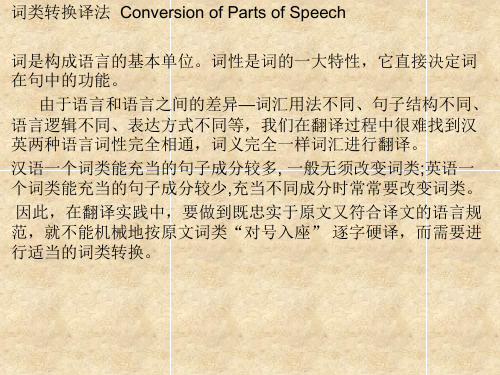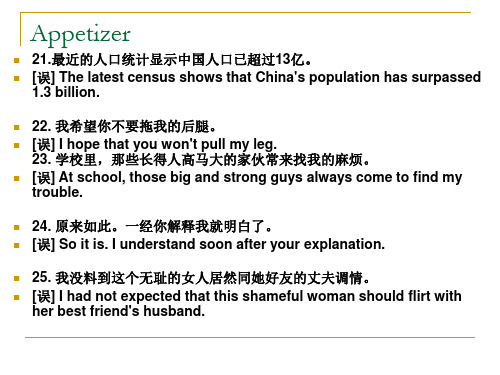第六节词类转译法
- 格式:doc
- 大小:38.50 KB
- 文档页数:2


翻译技巧 4 词类转译法英 英语 语与 与汉 汉语 语的 的一 一个 个显 显著 著差 差异异: 英语呈静态;汉语呈动态从词汇用法上,英语中常用抽象名词、动词的同源名词、同源形容词、副词及介词等来表达动 态含义。
而汉语的动词由于无形态变化,若要表示动作意义,往往只能采用动词。
Don’t believe him. You should know he is a good kidder .I’m doubtful whether he is still alive .Mother is on the telephone with father .词 词类 类转 转译 译法 法定定义 在翻译时, 由于两种语言在语法和习惯表达上的差异, 在保证原文意思不变的情况下,译文 必须改变词类,这就叫词类转移法 (C C o o n n v v e e r r s s i i o o nn ) , 又叫转换法,转译法。
Conversion of parts of speech is frequently and flexibly used in translation. Whether or not it is to be used seems not to be determined by the original, instead, it is determined by the target language, whose advantages must be taken and will be taken to the full by converting parts of speech of certain words.一、词类的转译(一) 英语名词的转译1 1. 英语名词—〉汉 汉语 语动动词 名词化 (n n o o m m i i n n a a l l i i z z a a t t i i o o n n) 成为英语使用中的普遍现象,构成了静态为主的语言特征。


第六节词类转译法第六节:词类转译法(Conversion)在英译汉过程中,有些句子可以逐词对译,有些句子则由于英汉两种语言的表达方式不同,就不能“一个萝卜一个坑”的方法来逐词对译。
原文中有些词在译文中需要转换词类,才能使汉语译文通顺自然。
词类转译的情况归纳起来有以下四种:一、转译成动词英语和汉语比较起来,汉语中动词用得比较多,这是一个特点。
往往在英语句子中只有一个谓语动词,而在汉语中却可以有几个动词或动词性结构连用。
汉语没有词形变化,但可以几个动词连用。
因此,英语中不少词类(尤其名词、前置词、形容词、副词)在汉译时往往可以转译成动词。
(一)名词转译成动词1、由动词派生的名词转译成动词,在政论文体中出现比较多。
1) One after another, speakers called for the downfall of imperialism, abolition of exploitation of man by man, liberation of the oppressed of the world.2)Rockets have found application for the exploration of the universe.2.含有动作意味的名词(在记叙、描写文体中出现较多)往往可以转译成动词。
1)As sight and sound of our jet planes filled me with special longing.2)As the week drew to a close, the enemy rout was complete.3.英语中有些加后缀-er的名词,如teacher教师, thinker思想家等等,有时在句子中并不指其身份和职业,而是含有较强的动作意味。
在汉语中没有恰当的对应名词时,往往可以译成动词。
1)I am afraid I can’t teach you swimming. I think my little brother is a better teacher than I.2)Talking with his son, the old man was the forgiver of the young man’s past wrong doings.4.作为习语主体的名词往往可转译成动词,如To have a rest和To have a good look at里的rest和look.1)They took a final look at Iron Mike, still intact in the darkness.2)The next new bulletin, shorter than usual, made no mention of the demonstration. (二)前置词转译成动词英语中前置词是用得相当多的,其中有些没有动作意味而仅表示时间、地点的前置词,汉译时往往可以省略,但有许多含有动作意味的前置词,如across, past, toward等等,汉译时往往可以译成动词。


词类转换英汉两种语言属于不同的语系,英语属于印欧语系,汉语属于汉藏语系。
不同语系的语言,无论在词汇方面或在语法方面都有很大的差别。
在科技英语翻译实践中,在很多情况下需要进行词类转换。
所谓词类转换,是指把原文语言中的某一词类转移成汉语的另一词类而言。
掌握翻译中的词类转换译法,就可使我们敢于脱离原文词类的限制,跳出原文词类的框框,用汉语的适当词类予以表达。
一,转换成汉语动词。
英语和汉语比较起来,汉语中动词用得比较多,这是一个特点,在英语句子中只用一个谓语动词,在汉语中却可以几个动词或动词性结构连用。
在英语中不少词类在汉译时往往可以转译成动词。
1,名词转换成动词英语量具有动作意义的名词和动词派生出来的名词往往可以译成动词。
With a click of a mouse, information from the other end of the globe will be transported to your computer screen at the dizzying speed of seven-and-a-half times around the earth per second.只要一点鼠标,来自世界另一端的信息便会以每秒绕地球七周半的惊人速度传输到你的电脑屏幕上。
China’s first atomic blast in october 1964 was a great shock to the world.1964年10月中国爆炸了第一颗原子弹,全球为之震惊。
Can artificial fibers be used as substitutes for natural fibers?人造纤维能代替天然纤维吗?We must place stress on the prevention of disease.我们应以预防疾病为主。
This situation requires the formation of a new strategic frame.这种形势要求制定新的战略框架。
第六节:词类转译法(Conversion)
在英译汉过程中,有些句子可以逐词对译,有些句子则由于英汉两种语言的表达方式不同,就不能“一个萝卜一个坑”的方法来逐词对译。
原文中有些词在译文中需要转换词类,才能使汉语译文通顺自然。
词类转译的情况归纳起来有以下四种:
一、转译成动词
英语和汉语比较起来,汉语中动词用得比较多,这是一个特点。
往往在英语句子中只有一个谓语动词,而在汉语中却可以有几个动词或动词性结构连用。
汉语没有词形变化,但可以几个动词连用。
因此,英语中不少词类(尤其名词、前置词、形容词、副词)在汉译时往往可以转译成动词。
(一)名词转译成动词
1、由动词派生的名词转译成动词,在政论文体中出现比较多。
1) One after another, speakers called for the downfall of imperialism, abolition of exploitation of man by man, liberation of the oppressed of the world.
2)Rockets have found application for the exploration of the universe.
2.含有动作意味的名词(在记叙、描写文体中出现较多)往往可以转译成动词。
1)As sight and sound of our jet planes filled me with special longing.
2)As the week drew to a close, the enemy rout was complete.
3.英语中有些加后缀-er的名词,如teacher教师, thinker思想家等等,有时在句子中
并不指其身份和职业,而是含有较强的动作意味。
在汉语中没有恰当的对应名词时,往往可以译成动词。
1)I am afraid I can’t teach you swimming. I think my little brother is a better teacher than I.
2)Talking with his son, the old man was the forgiver of the young man’s past wrong doings.
4.作为习语主体的名词往往可转译成动词,如To have a rest和To have a good look at
里的rest和look.
1)They took a final look at Iron Mike, still intact in the darkness.
2)The next new bulletin, shorter than usual, made no mention of the demonstration. (二)前置词转译成动词
英语中前置词是用得相当多的,其中有些没有动作意味而仅表示时间、地点的前置词,汉译时往往可以省略,但有许多含有动作意味的前置词,如across, past, toward等等,汉译时往往可以译成动词。
1)Party officials worked long hours on meager food, in cold caves, by dim lamps.
2)“Coming!” Away she skimmed over the lawn, up the path, up the steps, across the veranda, and into the porch.
(三)形容词转译成动词
英语中表示知觉、情欲、欲望等心理状态的形容词,在联系动词后作表语用时,往往可以转译成汉语动词。
常见的这类形容词有:
confident, certain, careful, cautious, angry, sure, ignorant, afraid, doubtful, aware, concerned, glad, delighted, sorry, ashamed, thankful, anxious, grateful, able等。
1)Doctors have said that they are not sure they can save his life.
2)The fact that she was able to send a message was a hint. But I had to be cautious.(四)副词转译成动词
1)As he ran out, he forgot to have his shoes on.
2) That day he was up before sunrise.
3)She opened the window to let fresh air in.
二.转译成名词
(一)英语中很多由名词派生的动词,以及有名词转用的动词,在汉语中往往不易找到相应的动词,这时可将其转译成汉语名词。
1)Formality has always characterized their relationship.
2)To them, he personified the absolute power.
(二)有些英语被动式句子中的动词,可以译成“受(遭)到……+名词”、“予(加)以+名词”这类结构。
Snow was treated very shabbily by the U.S. press and officialdom during this period, victimized for his views.
(三)形容词转译成名词
1.英语中有些形容词加上定冠词表示某一类的人,汉译时常译成名词。
1)They did their best to help the sick and the wounded.
2)Robin Hood and his merry men hated the rich and loved and protected the poor. 2.此外,根据情况还有些形容词可以译成名词
1)Stevenson was eloquent and elegant—but soft.
2)The Wilde family were religious.
3)They were considered insincere.
三、译成形容词
(一)形容词派生的名词往往可以转译成形容词。
1)The pallor of her face indicated cleared how she was feeling at the moment.
2)The security and warmth of the destroyer’s sick bay were wonderful.
(二)有些名词加不定冠词作表语时,往往可以译成形容词。
1)The blockade was a success.
2)As he is a perfect stranger in the city, I hope you will give him the necessary help.
3)Independent thinking is an absolute necessity in study.
四.其它词类转译
(一)形容词与副词的互相转译
1.英语名词译成汉语动词时,修饰该名词的形容词往往转译成汉语副词。
1)Occasionally a drizzle came down, and the intermittent flashes of lightning made us turn apprehensive glances toward Zero.
2)We took brief, restless naps, struggled to understand the intermittent br oadcasting of Radio Prague,…
2.英语动词译成汉语名词时,修饰该动词的副词往往转译成形容词。
1)The film “Carve Her Name with Pride” impressed him deeply.
2)The President had prepared meticulously for his journey.
3.由于英汉两种语言表达方式不同,还有一些英语形容词可译为汉语副词。
1)This is sheer nonsense.
2)Buckley was in a clear minority.
(二)名词与副词的互相转译
1.名词转译成副词
1)When he catches a glimpse of a potential antagonist, his instinct is to win him over with charm and humor.
2)The new mayor earned some appreciation by the courtesy of coming to visit the city poor.
2.副词转译成名词
1)They have not done so well ideologically, however, as organizationally.
2)He is physically weak but mentally sound.。